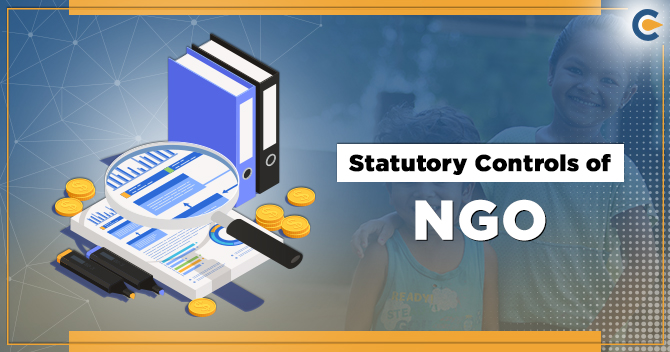The word NGO in India refers to a body that is separate from the governmental control & the profit framework for business as usual. The non governmental bodies work for the broad development of the internal guidelines of society and function as small unit which fills the gap in places where the government cannot reach proficiently, and business can’t be presented with remarkable returns governed by Statutory Controls of NGO.
The term NGO is used as an umbrella to cover all statutory control that look for charitable funds and use them to progress the society without any intention to take profits from it or use that profit for the work other than that of the non-governmental organization and benefit the same. An NGO can be formed as a trust institution or an association or a company.
NGOs can register itself as a legal entity in following three ways in India-
- Trust
- Society
- Section 8 Company
What are the Statutory Controls of NGO?
The following section talks about the statutory controls of NGO that one must do to display its seriousness according to the NGO laws-


Read our article:An Insight into New Era for Religious NGOs under Taxation
PAN Registration
After registering NGO with the respective authority, the first thing to do is to submit an application regarding PAN in name of the NGO. It is essential to point out the Permanent Account Number together with documentation in all the banking and money related transactions for income-tax assess, including NGO under the Income Tax Act[1].
Registration of NGOs under Section 12A
NGO Registration under Section 12A is important to attain tax benefits. Still, Section 12A documentation is not obligatory registration. The major reason for attaining this registration is to gain the benefit of tax exemption on the income of the NGO if all the regulations and policies set in section 12A are met.
Registration of NGOs under Section 80G
The NGO Registration under Section 80G is one of the leverage that an NGO can optimize under Statutory Controls of NGO. Registration under section 80G is not compulsory. But to provide 50% interest as well as full exemption of donations provided by the donors, it is necessary to obtain Section 80G Registrations. Registration under Section 80G can be used as a alternative way by NGOs to save funds.
FCRA Registration
Once the NGO registration is done, there will be various occasions to receive Foreign Funds for the working of the Non-Governmental Organization. It is necessary to register with FCRA administration as well as Ministry of Home Affairs (MCA). NGO cannot avail any kind of foreign donation or funds without having FCRA registration.
Responsibilities of having FCRA Registration
- The applicant should be operating for a minimum time limit of 5 years and it is necessary for it to be a registered entity.
- An entity should have spent INR 1o lakhs which excludes the administrative in the previous 3 years to reach its main motive.
- The financial statement for last 3 years should be submitted by the applicant that is required to be audited by a Chartered Accountant (CA).
TAN
After registration of NGO, it is required to apply for TAN to comply with the Statutory Controls of NGO. It becomes liable to remove the tax from source during the implementation of NGO at any time.
No precise document or Identity Proof is required for TAN registration. Form 49B is required to be filled and submitted for attaining TAN for your NGO.
And while NGOs are working, it is NGO’s responsibility to remove the tax from source; they are required to apply for taxes.
GST registration
NGO has to apply for the GST registration so as to comply with the Statutory Controls of NGO, if the gross revenue from works has crossed the basic exception limit for goods and services and services provided by NGO are like research activity or consultancy work.
Professional tax
Professional tax is the responsibility for Statutory Controls of NGO to deduct wages of employees and deposit it to the government. Professional tax Registration is a state government object. Therefore different states have different policy and rules for their professional tax.
Retirement benefits
In case the employees count in the NGO is more than the prescribed limit of employees provided in the act. In such cases the Retirement benefits gets applicable under the Statutory Controls of NGO. A retirement benefit like the savings, gratuities, ESIC and others applies to the NGO when it expands.
Shops and Establishment License
According to the Statutory Controls of NGO in India, if anyone of the NGO is hiring any employees in their office to do any work that is directly related to the NGO, the said NGO will have to obtain the Shops and Establishments License.
Conclusion
Depending upon the work as well as size of NGO, you can either apply for all the above statutory controls of NGO immediately after registration or as soon as the requirement occurs. Contact our experts at Corpbiz for hassle free services related to various legal compliances of NGO.
Read our article:Shedding Light on Subjects and Benefits of Educational NGO











